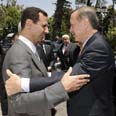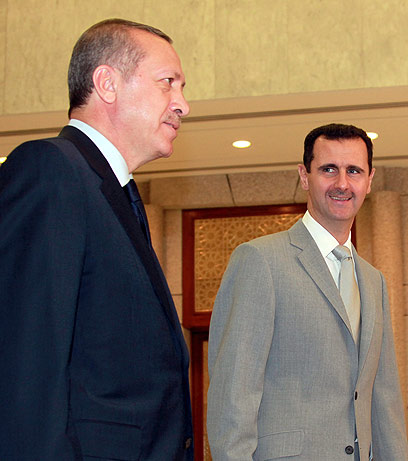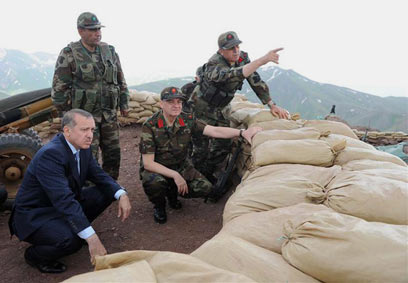
Will Assad-Erdogan love affair last?
Recent 'honeymoon' between Ankara, Damascus put to test following latest crisis in Syria. Erdogan expresses support for Assad, but at same time urges him to enact democratic reforms. Experts analyze balancing act between mutual interests, need to preserve democracy and human rights
"Ankara has been having a love affair with Damascus in the past few years; the Syria-Turkey relations is an extraordinary journey from hostile states to best friends," Turkish newspaper Todays Zaman wrote last week.
The op-ed piece called on Turkish Prime Minister Recep Tayyip Erdogan to pressure Syrian President Bashar Assad into launching democratic reforms.
Erdogan walked on egg shells this week – expressing support for his Syrian counterpart, while at the same time advising him to take a democratic approach toward the protesters.
But can Erdogan continue this strategy while bodies continue to pile on the streets of Syria, and on the backdrop of an upcoming election and concerns over Kurds gaining strength?
"Assad and Erdogan gambled on one another, and became close friends that support each other," Dr. Alon Liel, former Israeli ambassador to Turkey and Foreign Ministry director-general told Ynet.
According to Liel, Erdogan's call for reforms in Syria is in fact the best evidence for his support of Assad, compared with Mubarak, whom he urged to resign amid the popular uprising in Egypt.
"In Assad's case, Erdogan declared: Enact reforms, and we'll back you," said Liel.

Personal chemistry. Erdogan and Assad (Photo: EPA)
The former ambassador claimed that the seemingly strange friendship between a leader of a country that aspires to join the European Union and a country that is regarded as an outcast in the western world stems from Turkey's desire to become a regional power.
"Turkey has invested in Syria and strengthened its standing in the region, even in comparison with Iran and Egypt," Liel noted, adding that economic and military interests are also at play, in addition to "the personal chemistry" between the two leaders.
The relations between Turkey and Syria deteriorated to the brink of war during the 90s, after Syria granted asylum to Kurdish rebels and due to the territorial dispute surrounding Hatay province, which was finally resolved in 2004, a year after Erdogan came to power.
The same year Assad made history when he was the first Syrian president to visit Ankara in 68 years.

Demonstration in Turkey, February 2011 ( Photo: AP)
For Syria, who considered the United States under President George W. Bush as part of the axis of evil, the relations with Turkey is also important: "The friendship with Turkey scored Assad some major points," said Liel, "It's what pulled Syria out of isolation in the Iranian corner. Nowadays, Syria has a much more comfortable stance in the region than it had six years ago."
Prof. Ofra Benjo, a senior research fellow at the Moshe Dayan Center and lecturer of Middle East history at Tel Aviv University attributes the special relationship "not only to the affinity between two Muslim countries, but also to the private and public economic relations, which include a Turkish investment of some $1 billion in Syria, and many other investments in the political and social spheres, which might go down the drain," she explained.
'Arabic speaking pistachio vendors'
The economic change from the perspective of local resident was described in a New York Times article published last year. "Here in Gaziantep — whose past is so intertwined with Syria’s that it was part of Aleppo Province during the Ottoman Empire — the signs of the new honeymoon between Turkey and Syria are everywhere," wrote Dan Bilefsky."Every Friday, several thousand Syrians descend on the center of town. Lured by bargains and Western brands…In the city’s bazaars, pistachio vendors summon passers-by in Arabic, while Arabic courses for Turkish businessmen are flourishing. Marriages between Turks and Syrians have become more common," it was written.

Syrian protesters ripping Assad's portrait (Photo: MCT)
Cengiz Akinal, the manager of a large shoe manufacturer, told the New York Times reporter that his company, which exports a majority of its shoes to Europe, increased its exports to Syria by 40% last year.
Akinal also noted that the company recently relocated part of the company’s manufacturing to Aleppo and Damascus, where salaries are about half those of Turkey.
“Turkey may be 15 years behind Europe, but Syria is still 30 years behind Turkey,” he concluded.
'Blend of Islam and democracy'
In an article written from the Syrian city of Aleppo in 2009, New York Times reporter Robert F. Worth described the masses of Turkish tourists that visit the picturesque city, and the vendors in the antiques market that solicit business in Turkish.
“Before, we were afraid to come here,” said Omer Sonmez, a Turkish businessman who first visited Syria three months ago, and now crosses over regularly to trade roasted pumpkin seeds and other foods.
“We thought it would all be so closed, with no women on the street. But when you talk to Europeans, they say the same thing about Turkey!” he exclaimed.
In their analysis, which seems highly relevant to current times, both writers point to the political possibilities that are embodied within the mutul relationship: "Where the alliance with secular Turkey represents a move away from its courtship with Iran, Turkey’s blend of conservative Islam and cosmopolitan democracy is increasingly viewed as a model in the younger generation," wrote Bilefsky.
"Many (Syrians) hope that Turkey’s gradual shift over the past decade from military autocracy to a more democratic and tolerant political system will be replicated here. For the moment, they must be content with having new friends," noted Worth.
'Smart policies'
Alongside financial considerations, there is another important factor at play –Turkish concern over the Kurdish population in both countries, reaching some 1.4 million in Syria and a whopping 15-20 million in Turkey.
"The Turks are afraid of an uprising in Turkey, if Syrian Kurds decide to join in," explained Benjo.
"For the past few months Kurdish uprisings have been taking place in eastern Turkey, but do not get broad media coverage. They are as severe as those taking place across the Arab world – you have youngsters and even children handling Molotov cocktails, stones and fireworks.
"So far, the Turkish military has managed to divert the attention with swift suppression and a false claim according to which the riots are carried out only by PKK members," she noted.
"While the conflict between Turkey and the PKK cost the lives of tens of thousands of people, Erdogan's treatment of the Kurds is more moderate than that of his predecessors," said Benjo.
Erdogan's effort to thaw relations with the Kurds was evident this week when he held a historic visit to the autonomous Kurdish region in northern Iraq. "We started to establish the kinship between the Turkish peoples, which is the basis for economic development. We've put an end to the old policy that deprived them of their humanity," said Erdogan during the initiation ceremony for a new airport in the capital city of Arbil, which was built by a Turkish company.

Erdogan during visit to northern Iraq (Photo: AFP)
Iraqi Kurdistan's President Masoud Barzani lauded Erdogan and told him: "Turkey now has an important role in the region, thanks to your smart policies."
But will Erdogan's "smart policies" help him withstand the crisis in Syria?
"We advised Assad to respond positively to the long-lasting demands of the people and take a reformist approach that will help Syria overcome its problems more easily," Erdogan said last weekend, adding, "Assad didn't say no."
"Erdogan will continue his balancing act; he will speak against violence and use of force and in favor of human rights, in an effort to portray himself as a supporter of such rights.
He will present a moderate picture to the western world – to which he wants to belong – and continue to support Assad while seeing where the wind blows," predicted Benjo, adding that his support hinges on future developments; if Assad increases the use of violence against civilians, "Erdogan will find it difficult to continue backing him and his oppressive regime amid efforts to join the European Union," she noted.
On the other hand, Alon Liel estimated that Turkey will continue to support Syria unconditionally: "Despite all the casualties, I don’t see Erdogan abandoning Assad, or calling him to resign," Liel claimed, noting that the upcoming elections in Turkey on June 12 are part of the reason for the continued support, considering that Ankara has a lot to lose from a political crisis with Damascus.
Gili Gurel contributed to this report
- Follow Ynetnews on Facebook










